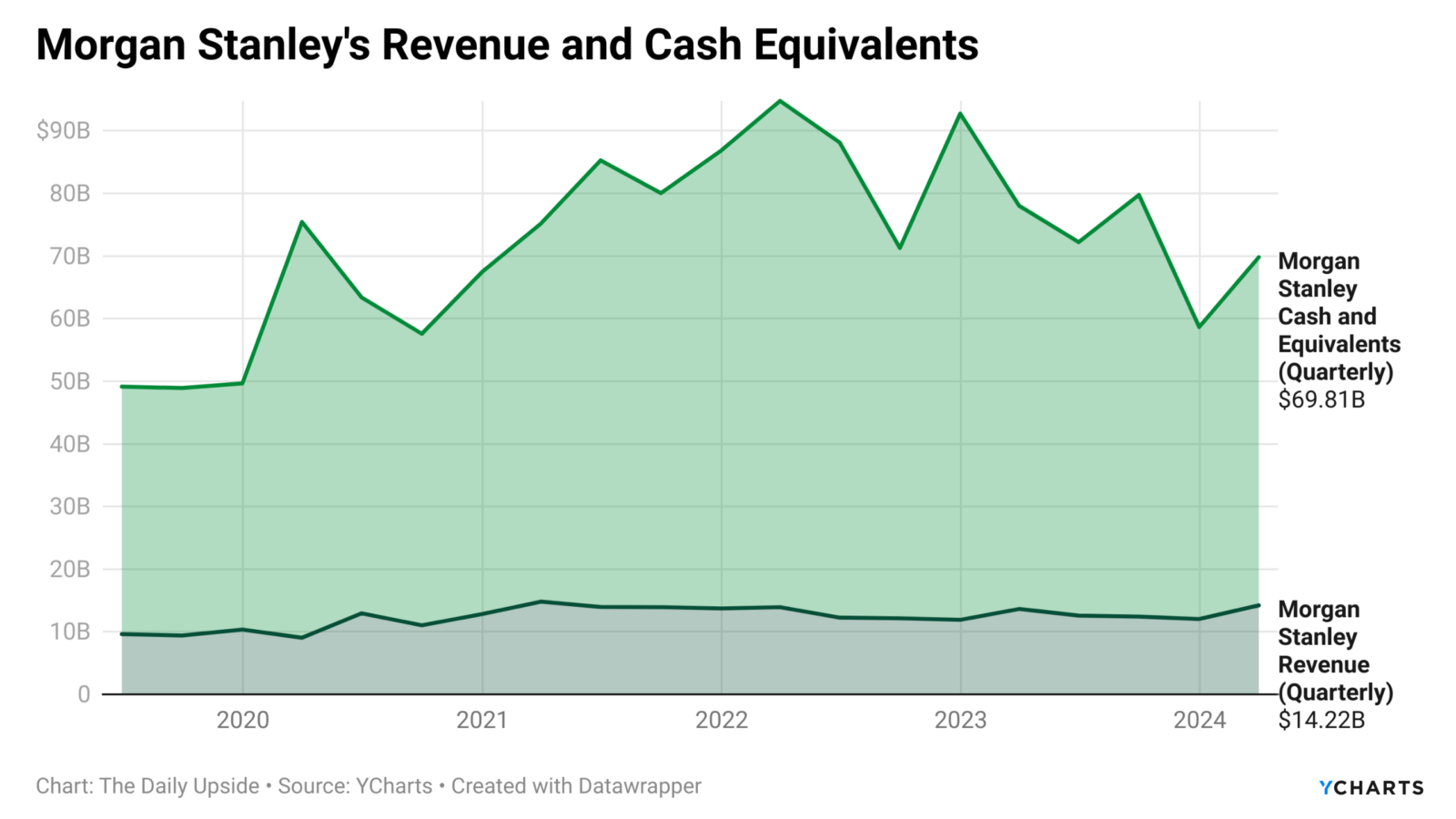Good morning.
Artificial intelligence is slated to take over the world, but its impact on wealth management has been far less provocative.
Enter Morgan Stanley’s latest AI-powered personal assistant, which is hitting Wall Street desks in July. Debrief is a new software that sits on an advisor’s computer, records Zoom calls, takes notes, and drafts follow-up emails. It could become a prototype for new wealthtech tools that free up thousands of hours of time for financial advisors and become centerpiece to any advisor’s tech build.
Now, if it could just straighten out my golf swing.
Will Investors Bet on Economic Data? Interactive Brokers Is All In

Forget Super Bowl LIX — the next big bet may be on the upcoming CPI print.
Interactive Brokers is the latest company to offer trades on economic events, announcing Wednesday that it will let customers use exchange-listed contracts to take sides on yes-or-no questions regarding the US economy. So-called event contracts allow investors to essentially place wagers on economic indicators, like whether the Initial Jobless Claims report comes in above or below analysts’ estimates.
They’re quickly hitting the mainstream. There were more than 130 contracts listed for trading in 2021, which was more than in the past 15 years combined, according to a proposed rule by the Commodity Futures Trading Commission. Some contracts even included non-finance bets, like guessing Oscar winners or predicting whether a natural disaster will hit certain US cities.
Bet Your Bottom Dollar
Event contracts have been around since 2004, but the trades have been mostly off the table for the majority of the investing public. While Interactive Brokers is not the first company to offer them — Kalshi and the Chicago Mercantile Exchange are others — it is arguably the largest and most well-known, with more than 2 million customer accounts. Investors can also place trades on other factors with Interactive Brokers, like US real GDP, the national debt, global temperature, or carbon dioxide levels in the atmosphere.
- Contracts range in price from $0.02 to $0.99, and like betting odds for sporting events, the price can move higher or lower within that range.
- Once the event is over, the contract immediately settles: $1 for a correct contract, and $0 for the wrong one.
“Planning for the future is the ultimate task for any business leader,” Interactive Brokers founder Thomas Peterffy said in a release. “The more perfect information we have about the state of the world, the more perfectly we can plan and coordinate our actions.”
Snake Eyes: Unlike a casino floor, investors can’t bet on everything, meaning the events have to have an economic angle. In May, the CFTC proposed a rule that would ban trades from certain activities, including political races, award contests, and sporting events. Hey, they have to leave something for DraftKings.
JPMorgan Takes on Goldman with Eye Towards The Uber Rich
JPMorgan Chase is no stranger to the super-wealthy, but a new business strategy has it ramping up the competition for wealth management’s richest clientele.
The Wall Street bank’s new push for the upper crust brought in more than $15 billion from ultra-high-net-worth clients, according to the Financial Times, and is placing it on a collision course with some of the biggest names in asset management, like Goldman Sachs and Morgan Stanley.
Death and Capital Gains Taxes
You might remember Goldman Sachs trying and failing to court Main Street consumers with products like Marcus and the Apple Card in recent years. Well, JPMorgan is doing the exact opposite.
The strategy taps into the growing popularity of separately managed accounts (SMAs). In addition to full ownership of the securities, SMAs’ big draw for wealthy investors is that they are good vehicles for tax-loss harvesting, when realized losses offset gains and eliminate the need to pay capital gains taxes.They also come with steeper fees and higher minimums, meaning, for the most part, only the rich stand to benefit:
- One JPMorgan banker told the FT, “(SMAs) might be the fastest-growing piece of asset management over the last 18-plus months.”
- An extra $15 billion may sound like a lot, and is providing JPMorgan good momentum in the UHNW space, but it can also be seen as chump change. In 2023, assets in SMAs grew to $2.2 trillion, according to Cerulli Associates data reported by the FT.
- Goldman Sach and Morgan Stanley’s Parametric accounted for the largest portions, with JPMorgan in third.
Even if JPMorgan is playing SMA catchup, ultra-wealth is certainly not in short supply for the Manhattan bank: It still has its 23 Wall unit, which advises fewer than 1,000 families worth more than $4.5 trillion.
Everybody’s Doing It: While big banks and the super-rich have an affinity for SMAs, small(er) fries like Invesco and Allspring Global Investments are getting in on the action, too. Earlier this year, the Wall Street Journal reported that the average SMA size is $450,000, but even Morgan Stanley offers options to open an account that lets investors hold fractional shares of stocks or ETFS for just $10,000. Oh, to experience how the other half lives.
Morgan Stanley Clients Earned .01% on Cash. Now, They’re Suing
A penny saved may be a penny earned, but at top Wall Street brokerages, it’s more like a basis point.
Morgan Stanley is the latest firm to be sued over the pencil-thin interest rates it pays its clients on assets held in cash. A class-action lawsuit filed by the estate of a deceased former customer revolves around the company’s use of cash sweeps — programs that generate additional income for banks using customers’ uninvested cash. It’s a commonplace practice that’s often disclosed to investors, but is gaining new attention as high-yield savings accounts offer interest rates topping 5%. With better-paying options elsewhere, the investing public is becoming more aware of what’s hidden in the fine print.
“This case concerns a simple ruse,” according to the complaint, filed June 14. The bank “devised a scheme” in which its advisers make significant profits on cash balances whereas the customer, who is owed a fiduciary duty, “literally loses money,” the lawsuit alleges.
The cash sweep program — what the bank calls its “net income interest” — grew exponentially to over $8 billion in 2023 alone, according to the complaint. With unprecedentedly high and sticky inflation, paying customers a single basis point on cash is simply a losing battle for savers.
Morgan Stanley declined to comment.

A Dollar Short
Everybody’s gotta make a buck, and cash sweeps are in no way illegal or even uncommon. In fact, they’re a legitimate practice for much of the banking industry, which is why savings accounts at the big banks generally offer peanuts by way of interest. Industry advocates say the sweeps help pay for other perks, like the free trades that are table stakes at almost every brokerage today.
Retail investors have piled into cash since the Federal Reserve began tightening the purse strings in 2022. Assets in money-market funds, that mimic cash holdings, rose to an all-time high this month as the Fed seems in no apparent rush to start cutting rates:
- US money-market funds had inflows of roughly $28 billion in the week of June 12, according to a weekly report from the Investment Company Institute.
- Assets ballooned to $6.12 trillion, topping a prior record high reached in April.
Cashing Out: To be fair, Morgan Stanley also offers numerous cash alternatives, which clients can choose to invest in. The cash sweep program, and the rates charged, are also disclosed to clients. The details can generally be found in the disclosures. (The fact that no one reads them — or even knows they exist — is another issue altogether.) A single basis point interest rate on cash is also an industry standard, and matches rates by competitors like Merrill Lynch and JPMorgan. What’s a basis point amongst friends?
Extra Upside
- WTF is a Bitcoin ETF? After getting off to a record-setting pace, Bitcoin ETFs are still just blah for financial advisers.
- Chump change: Interactive Brokers said a glitch at the New York Stock Exchange caused it to suffer a $48 million loss. Whoops.
- Not retirement-ready: A recent survey found a majority of retirees will need to hit a target of $1.2 million to live out their golden years, but most expect to fall far short.
Advisor Upside is edited by Sean Allocca. You can find him on LinkedIn.
Advisor Upside is a publication of The Daily Upside. For any questions or comments, feel free to contact us at advisor@thedailyupside.com.
